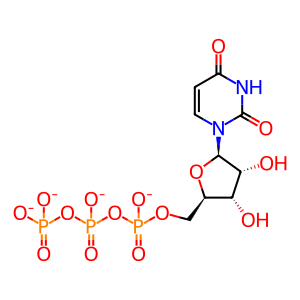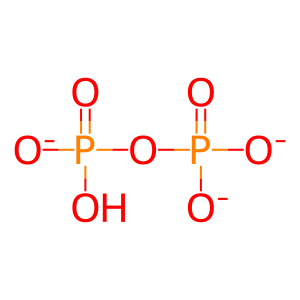Reaction: TUT4,TUT7 oligouridylate mRNA
- in pathway: Deadenylation of mRNA
Uridylyltransferases mediate the terminal uridylation of mRNAs, RISC-cleaved transcripts and of various non-coding RNAs including miRNAs and their precursors mRNAs (Scott and Norbury 2013, Lee et al. 2014, Munoz-Tello et al. 2015, Scheer et al. 2016).
TUT4 and TUT7 (ZCCHC11, ZCCHC6) are mRNA uridylation enzymes that can act on the majority of mammalian mRNAs (Lim et al. 2014). More than 85% of mRNAs are uridylated at a frequency of higher than 1% in NIH 3T3 and HeLa cells (Chang et al. 2014). Uridylated tails were found mainly on mRNAs with polyA tails of less than 25 nucleotides, suggesting that uridylation may occur after deadenylation. There was a negative correlation between uridylation frequency and mRNA half‑life, suggesting a role of uridylation in general mRNA decay (Lim et al. 2014). TUT4 and TUT7 (ZCCHC11, ZCCHC6) also uridylate replication-dependent histone mRNAs, which are not polyadenylated, to facilitate their degradation (Lackey et al 2016, Schmidt et al. 2011, Mullen & Marzluff 2008, Hoefig et al. 2013, Slevin et al. 2014). TUT4 and TUT7 also uridylate miRNAs and their precursors (Thornton et al. 2014, Lee et al. 2014, Ha & Kim 2014). Mono-uridylation of pre-miRNA facilitates miRNA processing, while polyuridylation of pre-miRNA triggers their degradation (Heo et al. 2012).
TUT4 and TUT7 are expressed during zygotic genome activation and uridylate the 3' ends of specific maternal mRNAs thereby targeting those mRNAs for degradation (inferred from mouse zygotes in Zhao et al. 2022). PABPN1L binds the terminal oligouridylate and recruits DIS3L2, a 3'-5' exoribonuclease (inferred from mouse zygotes in Zhao et al. 2022).
TUT4 and TUT7 (ZCCHC11, ZCCHC6) are mRNA uridylation enzymes that can act on the majority of mammalian mRNAs (Lim et al. 2014). More than 85% of mRNAs are uridylated at a frequency of higher than 1% in NIH 3T3 and HeLa cells (Chang et al. 2014). Uridylated tails were found mainly on mRNAs with polyA tails of less than 25 nucleotides, suggesting that uridylation may occur after deadenylation. There was a negative correlation between uridylation frequency and mRNA half‑life, suggesting a role of uridylation in general mRNA decay (Lim et al. 2014). TUT4 and TUT7 (ZCCHC11, ZCCHC6) also uridylate replication-dependent histone mRNAs, which are not polyadenylated, to facilitate their degradation (Lackey et al 2016, Schmidt et al. 2011, Mullen & Marzluff 2008, Hoefig et al. 2013, Slevin et al. 2014). TUT4 and TUT7 also uridylate miRNAs and their precursors (Thornton et al. 2014, Lee et al. 2014, Ha & Kim 2014). Mono-uridylation of pre-miRNA facilitates miRNA processing, while polyuridylation of pre-miRNA triggers their degradation (Heo et al. 2012).
TUT4 and TUT7 are expressed during zygotic genome activation and uridylate the 3' ends of specific maternal mRNAs thereby targeting those mRNAs for degradation (inferred from mouse zygotes in Zhao et al. 2022). PABPN1L binds the terminal oligouridylate and recruits DIS3L2, a 3'-5' exoribonuclease (inferred from mouse zygotes in Zhao et al. 2022).
Reaction - small molecule participants:
PPi [cytosol]
UTP [cytosol]
PPi [cytosol]
UTP [cytosol]
Reactome.org reaction link: R-HSA-8941312
======
Reaction input - small molecules:
UTP(4-)
UTP(4-)
Reaction output - small molecules:
diphosphate(3-)
diphosphate(3-)
Reactome.org link: R-HSA-8941312


